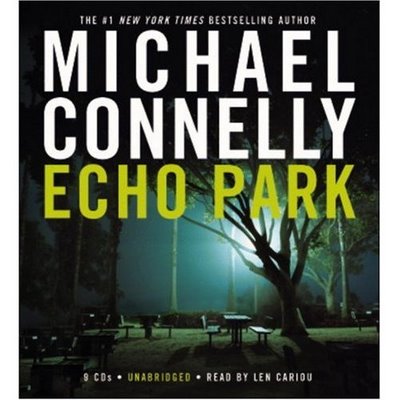
Echo Park is the twelfth Harry Bosch book that Michael Connelly has written, and it is one of the best as well. After all of this time it would be easy for Connelly to recycle Bosch projects and for the series to become stale, but this hasn’t happened. For some reason, the Harry Bosch of Echo Park is as vital as ever.
The plot of Echo Park is good, but not great. Bosch now works in a cold-case unit where he and his partner review and work cases that have gone dead over the years. This is where Bosch landed when he returned to the LAPD. It is a good fit for Bosch’s talents and temperament, as he has always been more of an avenging angle than a mere detective over the years. But it isn’t the plot that drives Connelly’s work, it is the man himself Harry Bosch.
Over the series, Connelly has worked at creating a character worthy of having a series. In Harry, Connelly has created a very complex man whose existence feels real. Other mystery/thriller writers have created characters of some complexity, but all of them seem to fall into various archetypes. Bosch does to an extent, but there is a consistency of character in Bosch which keeps him from falling to the same problems that plague other characters like Sanford’s Lucas Davenport or Burke’s Robicheaux. These characters seem to break character to try to create some life of domesticity, which is obviously impossible due to the nature of their work and their personalities. Both make compromises which are not in the character’s inherent nature to try to accommodate these plot twists. The families that the writers create act and feel more like plot devices rather than actual people, which is the difference between Connelly’s writing and theirs.
In Echo Park Bosch ultimately bends some rules, both legal and moral ones, to ultimately find some kind of justice. He is not Dirty Harry, but he does try to find ways to bring justice and peace to the victims and victims families. In a way, I find it very easy to imagine Bosch as the policeman that all police officers would love to be. Thematically, Connelly seems to continue to attempt to find out where Bosch’s limit is. How far will Harry go for justice? He certainly sabotages his prospects of domestic bliss with his actions, but again that is the point. A true idealist has only two options available: to be fabulously successful or to stay true to his or her ideals and end up alone. Harry obviously is on that latter path, and he is comfortable with his plight, which makes reading these novels so engaging.
Finally, it feels like Connelly has found a pace, and a place, for Bosch’s character to continue on in his quest of being the voice for the lost. Hopefully he will continue to mine the depths of Bosch’s character and burrowing into the dark beauty of Los Angles until Harry needs to retire.
No comments:
Post a Comment